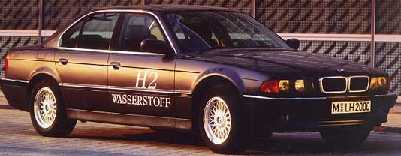
The system built to manage Russia’s nuclear legacy is crumbling, our new report shows
Our op-ed originally appeared in The Moscow Times. For more than three decades, Russia has been burdened with the remains of the Soviet ...
News

Publish date: September 22, 2000
Written by: Jens B. Smith
News
Six companies of the international oil and automotive industry have entered into a co-operation agreement to evaluate what would be needed to make methanol the primary fuel for the fuel cell vehicles. Any questions in connection to health, safety, environment and a fuel infrastructure are to be examined. The participants are the methanol producers Statoil, BP and Methanex, and BASF, DaimlerChrysler and XCELLSIS, which are working with catalyst technology, fuel cell cars and fuel cells. Hence, their economical reasons for aiming at methanol are differing.
The initiative of the group may be seen in connection to the discussion among the car manufacturers. Despite the fact that fuel cell cars are to be produced in batches within the next four years, they still haven’t decided what fuel they are to use. There are several alternatives, but the zero emission vehicles may only be realised through hydrogen. Carbon containing fuels, like methanol and gasoline, have to maintain the emissions of CO2. Moreover, methanol, generally known as wood alcohol, is very poisonous, and has lead to a lot of deaths. Nor economically, it is a god solution. There is no infrastructure for the distribution of methanol, and such an investment is extremely expensive. This is underlined by the very fact that methanol never can be anything but a temporary solution on the road to the hydrogen economy.
The uncertainties around the choice for a fitted fuel are particularly due the lack of perfect hydrogen storage. However, BMW has already launched a hydrogen car produced in batches. It is not equipped with fuel cells, but is using hydrogen in an internal combustion engine. The range is 350 km, and the fuel expenses are comparable to a normal car. The car has gone through extensive security tests, and is proven to be safe. In other words, BMW has, without doubt, shown that the hydrogen storage technology is ready for the new generation cars.
Bellona is considering initiatives in direction of carbon containing fuels as unfortunate and needless. We have a unique opportunity to start using zero emission vehicles, hence solving the environmental problems of the transport sector. After all, this is why we are developing the fuel cell vehicles.

Our op-ed originally appeared in The Moscow Times. For more than three decades, Russia has been burdened with the remains of the Soviet ...

The United Nation’s COP30 global climate negotiations in Belém, Brazil ended this weekend with a watered-down resolution that failed to halt deforest...

For more than a week now — beginning September 23 — the Zaporizhzhia Nuclear Power Plant (ZNPP) has remained disconnected from Ukraine’s national pow...

Bellona has taken part in preparing the The World Nuclear Industry Status Report 2025 and will participate in the report’s global launch in Rome on September 22nd.